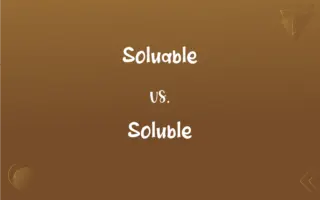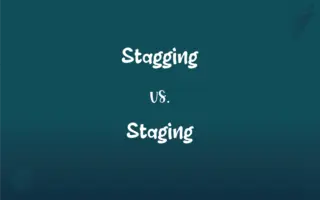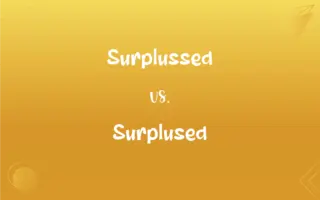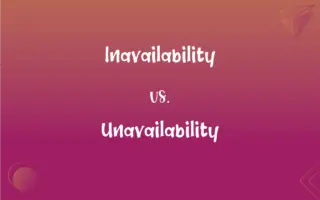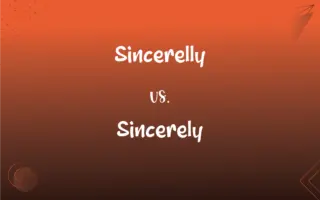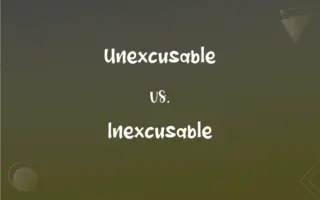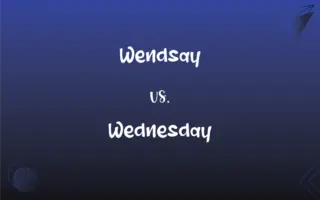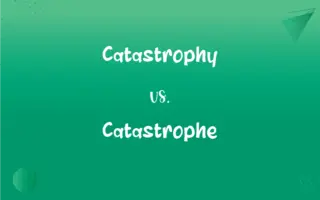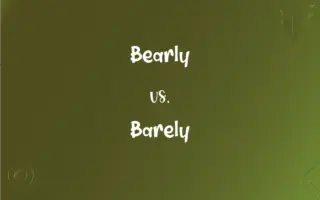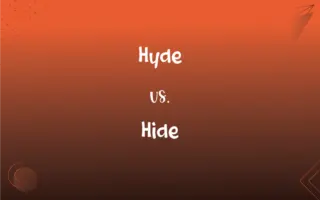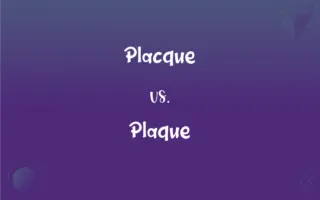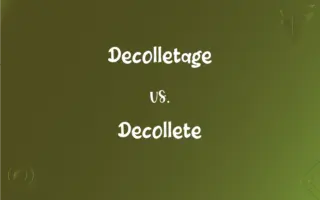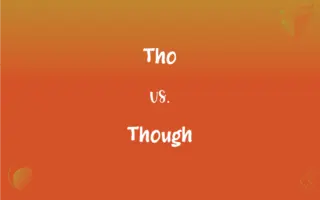Divice vs. Device: Mastering the Correct Spelling
Edited by Aimie Carlson || By Janet White || Updated on March 10, 2024
Correct: Device. A device is a tool or object created for a particular purpose, often technological or mechanical in nature.

Which is correct: Divice or Device
How to spell Device?

Divice is Incorrect

Device is Correct
ADVERTISEMENT
Key Differences
I before E: Remember the rule "i before e except after c"; device follows this rule.
Vowel Order: Think of 'ice' at the end of device; both have the same vowel order.
Technology Association: Associate the word with 'electronic device,' which both have an 'e' before the 'c'.
Rhyme Reminder: 'Device' rhymes with 'ice,' both end with 'ice.'
Visual Aid: Envision the word 'device' with a highlight on 'ice' to reinforce the correct spelling.
ADVERTISEMENT
Correct usage of Device
The new divice can perform multiple functions.
The new device can perform multiple functions.
We developed a divice to help with this problem.
We developed a device to help with this problem.
This divice is not working properly.
This device is not working properly.
Can you hand me that divice over there?
Can you hand me that device over there?
I need to charge my divice before we leave.
I need to charge my device before we leave.
Device Definitions
A device is a piece of equipment created for a specific function, often technological.
He invented a device for water purification.
In a broad sense, a device can be any implement or tool.
The surgeon used a specialized device during the operation.
In literature or art, a device is a technique or motif.
The author used a narrative device to enhance the story.
An object designed and manufactured to perform one or more functions.
A literary contrivance, such as parallelism or personification, used to achieve a particular effect.
A decorative design, figure, or pattern, as one used in embroidery.
A graphic symbol or motto, especially in heraldry.
A plan or scheme for accomplishing something
“Now Lydgate might have called at the warehouse, or might have written a message on a leaf of his pocket-book and left it at the door. Yet these simple devices apparently did not occur to him” (George Eliot).
Any piece of equipment made for a particular purpose, especially a mechanical or electrical one.
(computer hardware) A peripheral device; an item of hardware.
A project or scheme, often designed to deceive; a stratagem; an artifice.
(Ireland) An improvised explosive device, home-made bomb
(rhetoric) A technique that an author or speaker uses to evoke an emotional response in the audience; a rhetorical device.
(heraldry) A motto, emblem, or other mark used to distinguish the bearer from others. A device differs from a badge or cognizance primarily as it is a personal distinction, and not a badge borne by members of the same house successively.
(archaic) Power of devising; invention; contrivance.
(legal) An image used in whole or in part as a trademark or service mark.
(printing) An image or logo denoting official or proprietary authority or provenience.
(obsolete) A spectacle or show.
(obsolete) Opinion; decision.
That which is devised, or formed by design; a contrivance; an invention; a project; a scheme; often, a scheme to deceive; a stratagem; an artifice.
His device in against Babylon, to destroy it.
Their recent device of demanding benevolences.
He disappointeth the devices of the crafty.
Power of devising; invention; contrivance.
I must have instruments of my own device.
An emblematic design, generally consisting of one or more figures with a motto, used apart from heraldic bearings to denote the historical situation, the ambition, or the desire of the person adopting it. See Cognizance.
Knights-errant used to distinguish themselves by devices on their shields.
A banner with this strange device -Excelsior.
Anything fancifully conceived.
A spectacle or show.
Opinion; decision.
Any artifactual object designed to perform an action or process, with or without an operator in attendance.
An instrumentality invented for a particular purpose;
The device is small enough to wear on your wrist
A device intended to conserve water
Something in an artistic work designed to achieve a particular effect
Any clever (deceptive) maneuver;
He would stoop to any device to win a point
Any ornamental pattern or design (as in embroidery)
An emblematic design (especially in heraldry);
He was recognized by the device on his shield
A device is any mechanical or electronic apparatus designed for a particular use.
She fixed the device with precision.
Device can also mean a plan or scheme, especially in literary contexts.
The plot's device kept the readers engaged.
Device Sentences
The device connects to your home network wirelessly.
We use a special device to track wildlife movements.
The latest smartphone is an incredibly powerful device.
Scientists use this device to measure air quality.
This device helps monitor heart rate and activity levels.
This kitchen device can chop vegetables in seconds.
Each device on the network has a unique identifier.
He invented a device that makes clean water more accessible.
The device can store thousands of songs and playlists.
The gaming device offers virtual reality experiences.
The device automatically updates its software over the internet.
The device is designed to be user-friendly and intuitive.
FAQs
What is the pronunciation of Device
Device is pronounced as \dɪˈvaɪs.
Which vowel is used before Device
The vowel 'e' is used before the 'c' in device.
What is the plural form of Device
The plural form is "devices."
Which conjunction is used with Device
Conjunctions like "and" and "or" can be used (e.g., "device and tool," "device or gadget").
What is the verb form of Device
There is no verb form of "device"; it is only a noun.
Is Device an adverb
No, device is not an adverb.
Is Device a negative or positive word
Device is a neutral word; it can be either positive or negative depending on context.
Why is it called Device
The term "device" comes from Old French 'devis,' meaning plan, intention, or invention.
What is the root word of Device
The root word of "device" is from the Old French 'devis,' which means plan or design.
Which article is used with Device
Both "the" and "a" can be used, depending on context (e.g., "the device," "a device").
What is the singular form of Device
The singular form is "device."
Which preposition is used with Device
Prepositions like "with," "on," and "of" are used (e.g., "with a device," "device of communication").
Is Device a countable noun
Yes, device is a countable noun.
Is Device a collective noun
No, device is not a collective noun.
How do we divide Device into syllables
Device is divided as de-vice.
Which determiner is used with Device
Determiners like "the," "this," or "a" can be used (e.g., "the device," "this device").
Is the Device term a metaphor
Device itself is not a metaphor, but it can be used metaphorically in some contexts.
How many syllables are in Device
There are two syllables in device.
What is the first form of Device
Device does not have a first form as it's not a verb.
What is the third form of Device
Device does not have a third form as it's not a verb.
Is Device a vowel or consonant
The word device contains both vowels and consonants.
What is a stressed syllable in Device
The second syllable in device is stressed: de-VICE.
What part of speech is Device
Device is a noun.
Is Device a noun or adjective
Device is a noun.
Is the word Device is imperative
No, device is not an imperative; it’s a noun.
What is another term for Device
Another term for device is "gadget."
What is the second form of Device
Device does not have a second form as it's not a verb.
Is Device an abstract noun
No, device is a concrete noun, as it refers to a physical object.
What is the opposite of Device
The opposite of a device can be "manual tool" or "non-technological implement."
About Author
Written by
Janet WhiteJanet White has been an esteemed writer and blogger for Difference Wiki. Holding a Master's degree in Science and Medical Journalism from the prestigious Boston University, she has consistently demonstrated her expertise and passion for her field. When she's not immersed in her work, Janet relishes her time exercising, delving into a good book, and cherishing moments with friends and family.
Edited by
Aimie CarlsonAimie Carlson, holding a master's degree in English literature, is a fervent English language enthusiast. She lends her writing talents to Difference Wiki, a prominent website that specializes in comparisons, offering readers insightful analyses that both captivate and inform.
